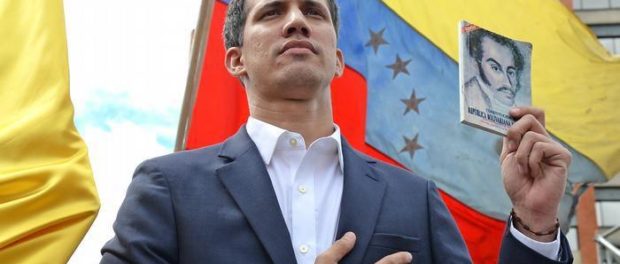ST. VINCENT DESCRIBES ACTION OF VENEZUELAN LEADER AS “PROVOCATIVE”.
Get our headlines on WHATSAPP: 1) Save +1 (869) 665-9125 to your contact list. 2) Send a WhatsApp message to that number so we can add you 3) Send your news, photos/videos to times.caribbean@gmail.com

St. Vincent and the Grenadines has described the action of Venezuelan opposition Leader, Juan Guaido, in declaring himself president of the South American country as “provocative” adding it has “a deep sense of unease and apprehension” about recent developments in Venezuela.
Guaido has since said he would consider an amnesty for the incumbent Nicolas Maduro and has called on the military to back his new interim administration.
But in a statement, the Ralph Gonsalves administration, which has strongly backed the Maduro government, said the decision by some Latin American countries to recognise Guaido “goes against the fundamental principle of non-interference into the internal affairs of a sovereign state which is established within the Organization of American States (OAS) Charter, the Inter-American Democratic Charter and the United Nations Charter”.
Maduro was sworn in earlier this month for a second consecutive term as President of the oil-rich South American country that is facing severe economic and political instability, resulting in a number of its nationals fleeing to neighbouring countries.
The United States, Canada, Brazil, Colombia, Chile, Peru and Argentina are among countries that have also recognised Guaido, the head of Venezuela’s opposition-controlled legislature, claiming that the polls have resulted in Maduro’s electoral victory last year were not free and fair.
But Russia, China as well as Cuba remain supportive of Maduro and has warned Washington about seeking to remove him from power.
In its statement, Kingstown said that it is “dismayed at the provocative actions by the National Assembly President, Mr. Juan Guaido, which serves to destabilise severely order and the rule of law” within Venezuela.
“In order to maintain the democratic fabric of the Venezuelan society, the Government of St. Vincent and the Grenadines urges both the Government and Parliamentary opposition to engage in meaningful dialogue inclusive of civil society and the business community without recourse to any action which can further erode the rule of law and lead to violence and civil unrest.”
St. Vincent and the Grenadines government said that it was calling on all members of the OAS to respect the sovereignty of Venezuela, the legitimacy and legality of its government headed by President Maduro, and to promote an environment of peace and dialogue with a view to maintaining regional and hemispheric order for the peaceful co-existence among states.
Earlier this month, Jamaica, Haiti, the Bahamas, Guyana and St. Lucia supported a resolution at the OAS in not recognising the second five-year term of Maduro, while Dominica, St. Vincent and the Grenadines and Suriname voted against the measure.
St. Kitts-Nevis, Trinidad and Tobago, Antigua and Barbuda, Barbados, and Belize abstained during the vote while Grenada was not present.
“The Government of St. Vincent and the Grenadines remains fully supportive of efforts to resolve through peaceful means, the current challenges and problems in Venezuela. The engendering of violence will not aid any necessary and desirable political solution. We call on all parties to accord full respect to the rule of law, inclusive of the promotion of peace, order, and good governance,” the statements said.”
Late Thursday night, the 15-member Caribbean Community (CARICOM) grouping issued a statement stating that it was seeking an “urgent meeting” with the United Nations Secretary General, António Guterres, in a bid to resolve the ongoing political developments in Venezuela.
In the statement that followed their video conference, the regional leaders said that they are “closely” following the “current unsatisfactory situation” in Venezuela and “expressed grave concern about the plight of the people….and the increasing volatility of the situation brought about by recent developments which could lead to further violence, confrontation, breakdown of law and order and greater suffering for the people of the country”.
CARICOM countries have also “reaffirmed their guiding principles of non-interference and non-intervention in the affairs of states, respect for sovereignty, adherence to the rule of law, and respect for human rights and democracy”.
Leave a comment
You must be logged in to post a comment.